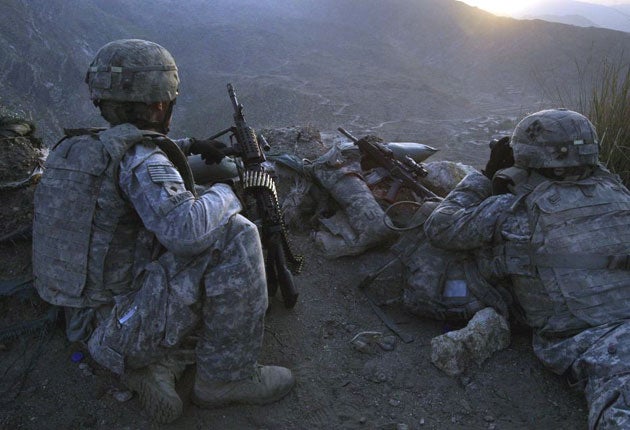Barge Matal: 'It's a place we never want to go back to'
Julius Cavendish reports from the front line on America's battle with the Taliban

During a lull in the battle the chaplain waded into a fast-flowing mountain river, invoked the power invested in him by Jesus Christ, and baptised Jeffrey Meeker. Meeker, an American soldier whose flak jacket had stopped a sniper's bullet en route to his spine the previous evening, wanted to make his peace with God.
The battle of Barge Matal, in which hundreds of insurgents and foreign fighters tried to seize a remote and insignificant village, was ferocious. It was also the kind of fight that General Stanley McChrystal, the US Nato commander hopes will soon become a forgotten chapter in the Afghan war. Barge Matal is isolated by its highland geography; few people live there; and however well the battle went the gains would, at best, be marginal.
Part of the McChrystal strategy is to pull troops back from remote mountain outposts and concentrate them in the towns and villages where more of the Afghan population lives. By putting the emphasis on protecting civilians instead of killing Taliban fighters he hopes to drive a wedge between the two, isolating and alienating the insurgents. But US military officials have said that the strategy has repeatedly been delayed by a shortage of cargo helicopters, military bureaucracy and Afghan politics.
In the case of Barge Matal, General McChrystal's hand was forced by President Hamid Karzai, who was horrified at the signal that abandoning the town to the insurgents would send, especially with a presidential election underway. Much of the surrounding area was lawless. "For there to be a pro-government village here was a big thing," one of the US officers who fought there said. In went soldiers from the 3rd Brigade of the 10th Mountain Division. What was supposed to be a four-day operation would last two and a half months and cost three US lives.
President Obama's decision on how many more brigades to send to Afghanistan will also hinge on how extensively he wants to apply the McChrystal strategy. Although counter-insurgency doctrine stipulates that a force of over half a million is needed to quell Afghanistan's insurgency, the surge options before him are predicated on holding the country's major population centres while Nato troops train Afghan security forces to the point where they can manage alone.
In line with the drive to concentrate on protecting towns and villages, US troops are now abandoning mountain outposts in eastern Afghanistan where for years soldiers have been drawn into battles of attrition for questionable return. Six outposts have been closed and 300 soldiers relocated, the most recent being "Combat Outpost Vegas" in the Korengal Valley-a place known informally as "Enemy Central".
Some of the worst US losses have come in places like these. In Barge Matal, soldiers say they called in air strikes virtually on top of themselves; asked helicopter gunships to launch rockets into buildings next to them; and ran out of hand grenades. They also claim the Afghan National Army commander with them shot himself in the leg to get evacuated and that his second-in-command promptly did the same. The noise was so loud the newly baptised soldier had to be flown out after losing his hearing.
"There were so many near-death experiences," Capt Kevin Mucher, the chaplain accompanying Attack Company, part of the US 10th Mountain Division, said. "Veterans express it as the worst contact they've ever been in."
Another soldier, Captain Micah Chapman, said: "I think everyone in my platoon would agree it's a place they never want to go back to. It's the first time I got on an air assault [extraction] out of somewhere and heard soldiers cheering."
Join our commenting forum
Join thought-provoking conversations, follow other Independent readers and see their replies
Comments